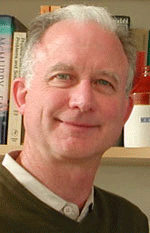 |
|
| C. Robert Matthews, PhD |
The Protein Society has recognized C. Robert Matthews, PhD, the Arthur F. and Helen P. Koskinas Professor of Biochemistry & Molecular Pharmacology, as a pioneer and innovator in developing and applying methods for elucidation of protein folding mechanisms, providing seminal insight into the coupling between folding and function.
Dr. Matthews, chair and professor of biochemistry & molecular pharmacology, will receive the Protein Society’s Carl Brändén Award during its 29th Annual Symposium in Barcelona in July. Matthews is one of seven leaders of the international protein science community to be honored in 2015.
The Carl Brändén Award, sponsored by Rigaku Corporation, honors an outstanding protein scientist who has also made exceptional contributions in the areas of education and/or service to the field.
“Bob Matthews has made a series of seminal discoveries in the field of biochemistry over a long and distinguished career. What is most impressive, however, is how his contributions have spanned the missions of research, education and faculty career development,” said Terence R. Flotte, MD, the Celia and Isaac Haidak Professor in Medical Education, dean of the School of Medicine and provost and executive deputy chancellor of UMass Medical School.
Society officials described Matthews’ service to the protein scientists’ community as exceptional.
Matthews’ work includes the introduction of the chevron plot and is among the first applications of site-directed mutagenesis in folding studies. Results from his studies of the energetics and kinetics of protein folding pathways have provided the basis for fundamental concepts such as parallel pathways and off-pathway intermediates.
Among many contributions, Matthews has served among the leadership of the Federation of American Societies for Experimental Biology and the American Society for Biochemistry and Molecular Biology, served on the Molecular Biophysics NIH study section for five years (serving as chair for the last two), served three years on the NIH Review Panel for Molecular Biophysics, co-founded the Protein Folding Consortium, contributed editorially to multiple journals, and has held several positions of leadership within the Protein Society, including his service as president from 2003 to 2005.